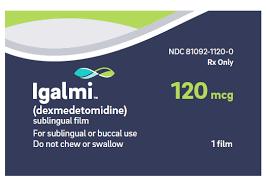Igalmi (buccal/sublingual)
Generic name: dexmedetomidine (buccal/sublingual) [ DEX-med-e-TOE-mi-deen ]
Brand name: Igalmi
Drug class: Miscellaneous anxiolytics, sedatives and hypnotics
What is Igalmi (buccal/sublingual)?
Igalmi (buccal/sublingual) is used in adults to treat agitation associated with schizophrenia or bipolar disorder.
Igalmi (buccal/sublingual) may also be used for purposes not listed in this medication guide.
Igalmi (buccal/sublingual) side effects
Get emergency medical help if you have signs of an allergic reaction: hives, difficult breathing, swelling of your face, lips, tongue, or throat.
Igalmi may cause serious side effects. Call your doctor at once if you have:
-
fast, slow, or irregular heartbeats; or
-
a light-headed feeling, like you might pass out.
Common side effects of Igalmi may include:
-
dizziness, drowsiness;
-
numbness, tingling, burning pain;
-
loss of sensation in the mouth, dry mouth; or
-
feeling like you might pass out.
This is not a complete list of side effects and others may occur. Call your doctor for medical advice about side effects. You may report side effects to FDA at 1-800-FDA-1088.
Related/similar drugs
olanzapine, dexmedetomidine, loxapine, amitriptyline / perphenazine, Zyprexa Intramuscular
Warnings
Use only as directed. Tell your doctor if you use other medicines or have other medical conditions or allergies.
Before taking this medicine
Tell your doctor if you have ever had:
-
low blood pressure, or if you are dehydrated;
-
a serious heart condition such as severe heart block;
-
a heart rhythm disorder;
-
long QT syndrome; or
It is not known if Igalmi (buccal/sublingual) will harm an unborn baby. Tell your doctor if you are pregnant or plan to become pregnant.
If you are breastfeeding, tell your doctor if you notice irritability in the nursing baby.
How is Igalmi (buccal/sublingual) given?
Follow all directions on your prescription label and read all medication guides or instruction sheets. Your doctor may occasionally change your dose.
Igalmi (buccal/sublingual) should be administered under the supervision of a healthcare professional.
For sublingual use, place Igalmi under the tongue and allow it to dissolve. Do not swallow or chew.
For buccal use, place Igalmi behind the lower lip and allow it to dissolve. Do not swallow or chew.
Do not eat or drink for at least 15 minutes after sublingual use, or at least one hour after buccal use.
Remain sitting or lying down after using Igalmi (buccal/sublingual).
Your vital signs may be watched during treatment.
You may have withdrawal symptoms after you stop using Igalmi (buccal/sublingual). The most common withdrawal reactions are nausea, vomiting, and agitation.
Store Igalmi in the foil pouch at room temperature away from moisture and heat.
What happens if I miss a dose?
In a medical setting you are not likely to miss a dose.
What happens if I overdose?
Seek emergency medical attention or call the Poison Help line at 1-800-222-1222.
What should I avoid while receiving Igalmi (buccal/sublingual)?
Avoid driving or hazardous activity until you know how Igalmi will affect you. Dizziness or drowsiness can cause falls, accidents, or severe injuries.
What other drugs will affect Igalmi (buccal/sublingual)?
Igalmi (buccal/sublingual) can cause a serious heart problem. Your risk may be higher if you also use certain other medicines for infections, asthma, heart problems, high blood pressure, depression, mental illness, cancer, malaria, or HIV.
Using Igalmi (buccal/sublingual) with other drugs that make you drowsy can worsen this effect. Ask your doctor before using opioid medication, a sleeping pill, a muscle relaxer, or medicine for anxiety or seizures.
Other drugs may affect Igalmi (buccal/sublingual), including prescription and over-the-counter medicines, vitamins, and herbal products. Tell your doctor about all other medicines you use.
More about Igalmi (dexmedetomidine)
- Check interactions
- Compare alternatives
- Pricing & coupons
- Drug images
- Latest FDA alerts (2)
- Side effects
- Dosage information
- During pregnancy
- FDA approval history
- Drug class: miscellaneous anxiolytics, sedatives and hypnotics
- Breastfeeding
- En español
Patient resources
Other brands
Professional resources
Other brands
Related treatment guides
Further information
Remember, keep this and all other medicines out of the reach of children, never share your medicines with others, and use this medication only for the indication prescribed.
Always consult your healthcare provider to ensure the information displayed on this page applies to your personal circumstances.
Copyright 1996-2024 Cerner Multum, Inc. Version: 1.02.

